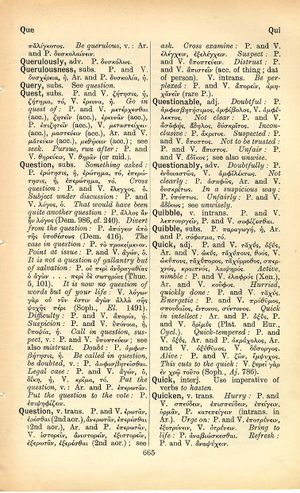quicken: Difference between revisions
From LSJ
Ἀναβάντα γὰρ εἰς τὴν ἀκρόπολιν, καὶ διὰ τὴν ὑπερβολὴν τῆς λύπης προσκόψαντα τῷ ζῆν, ἑαυτὸν κατακρημνίσαι → For he ascended the acropolis and then, because he was disgusted with life by reason of his excessive grief, cast himself down the height
(CSV4) |
m (Woodhouse1 replacement) |
||
| Line 1: | Line 1: | ||
{{Woodhouse1 | {{Woodhouse1 | ||
|Text=[[File:woodhouse_665.jpg|thumb|link={{filepath:woodhouse_665.jpg}}]] | |Text=[[File:woodhouse_665.jpg|thumb|link={{filepath:woodhouse_665.jpg}}]] | ||
===verb transitive=== | |||
[[hurry]]: [[prose|P.]] and [[verse|V.]] [[σπεύδειν]], [[ἐπισπεύδειν]], [[ἐπείγειν]], [[ὁρμᾶν]], [[prose|P.]] [[κατεπείγειν]] (intrans. in [[Aristophanes|Ar.]]). | |||
[[urge on]]: [[prose|P.]] and [[verse|V.]] [[ἐποτρύνειν]], [[ἐξοτρύνειν]], [[verse|V.]] [[ὀτρύνειν]]. | |||
[[bring to life]]: [[prose|P.]] [[ἀναβιώσκεσθαι]]. | |||
[[refresh]]: [[prose|P.]] and [[verse|V.]] [[ἀναψύχειν]]. | |||
}} | }} | ||
Revision as of 08:54, 20 May 2020
English > Greek (Woodhouse)
verb transitive
hurry: P. and V. σπεύδειν, ἐπισπεύδειν, ἐπείγειν, ὁρμᾶν, P. κατεπείγειν (intrans. in Ar.).
urge on: P. and V. ἐποτρύνειν, ἐξοτρύνειν, V. ὀτρύνειν.

